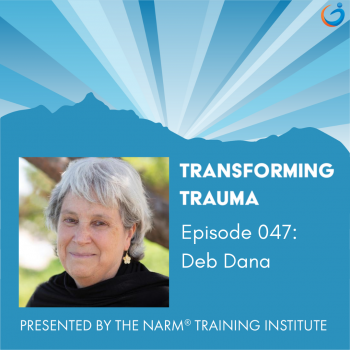Transforming Trauma Episode 047: The Rhythm of Regulation: Exploring the Polyvagal Theory with Deb Dana
A podcast brought to you by the NARM® Training Institute
In this episode of Transforming Trauma, we are joined by Deb Dana, LCSW, founding member of the Polyvagal Institute and Coordinator of the Traumatic Stress Research Consortium at the Kinsey Institute, Indiana University. Deb shares with our host, Sarah, about her work with the Polyvagal Theory, a clinical theory developed by Dr. Stephen Porges, and how she has translated the theory into clinical application, including everyday application. Deb describes the Polyvagal framework that views the nervous system as a common denominator of human experience, and shares, “It’s my belief we should all learn how to operate our nervous systems in some way.”
Deb breaks down the Polyvagal Theory for listeners, stating that although it is a complex and layered model, there is also a simplicity to it. In order to create simplicity, Deb shares three organizing principles: hierarchy, neuroception, and co-regulation.The Polyvagal Theory identifies a hierarchy of three nervous system states that people move through: a regulated ventral vagal state, a sympathetic energized fight-or-flight state, and a disconnected dorsal vagal state. Neuroception describes how the nervous system takes in information below the level of our conscious awareness via three pathways: inside our body, outside our body, and in-between our body systems. Deb shares how she uses neuroception as a therapist to support her clients’ awareness of their nervous system. When she is anchored and regulated in her own experience, she’s able to notice dysregulation within herself and her client and reflect it back to her client when appropriate. Lastly, Deb describes co-regulation as a biological imperative — it is a state that all people need in order to survive — nervous systems seek to co-regulate with other nervous systems.
With these three principles in mind, Deb talks further about how different life experiences, including developmental trauma, result in nervous systems moving in and out of regulation and dysregulation in different ways. Deb says, “It’s not so much what happened to you, it’s how your nervous system responds to what happens to you.” This understanding is aligned with the NeuroAffective Relational Model (NARM) and highlights how different people experience and adapt to the same traumatic experience in different ways.
Deb describes a “safety-danger equation” that people unconsciously calculate in order to determine what feels safe for them at any given moment. Sarah shares how this orientation aligns with what is referred to in NARM as Adaptive Survival Styles, the ways that children learn to adapt to developmental trauma and which gets carried into adulthood as filters for viewing Self, others and one’s life.
Deb highlights that dysregulation is a natural process, and it is an unrealistic and unattainable goal to be regulated and in a ventral state all the time. What is important is to be able to find our way back to an open, safe, connected state after dysregulation and disconnection. Deb says, “The job is not to never have a rupture, but to notice when there are ruptures and to be able to repair them.”
Deb and Sarah both emphasize the importance of curiosity and being able to sit with the unknown, and how that leads to a greater awareness of our nervous system states. In NARM, the process of inquiry invites curiosity and compassion for the clients’ experience and nervous system states, which supports what in NARM is called an “Embodied Adult Consciousness”.
Deb adds that she sees inquiry as a way of taking a look at the stories we tell ourselves about our nervous system states — often self-blame, self- shame, and self-criticism. The conversation concludes with Deb and Sarah sharing the powerful outcomes of having more awareness of our nervous system states, more curiosity, and more compassion for ourselves.

Subscribe for All Episodes
on your Favorite Service:
We want to connect with you!
Facebook @NARMtraining
Twitter @NARMtraining
YouTube
Instagram @thenarmtraininginstitute
Learn more about The NARM Training Institute: http://www.narmtraining.com
Sign up for a free preview of The NARM Inner Circle Online Membership Program: http://www.narmtraining.com/freetrial
About Deb: Deb Dana, LCSW, is a clinician and consultant specializing in working with complex trauma and Coordinator of the Traumatic Stress Research Consortium at the Kinsey Institute, Indiana University. She developed the Rhythm of Regulation clinical training series and lectures internationally on ways in which polyvagal theory informs work with trauma survivors.
Deb’s info for webpage:
Deb Dana offers trainings, podcasts, interviews on her website www.rhythmofregulation.com and on the Polyvagal Institute website www.polyvagalinstitute.org